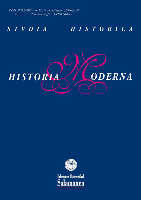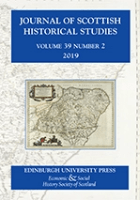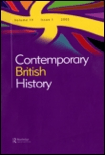
Studia Historica-Historia Moderna
Scope & Guideline
Advancing Historical Discourse for Future Generations
Introduction
Aims and Scopes
- Socio-Economic History:
The journal focuses on the socio-economic structures of modern Spain and its territories, examining trade, finance, and the impact of economic policies on society. - Political Dynamics and Governance:
Research often delves into the political frameworks of the Spanish monarchy and its governance strategies, including the roles of nobility, institutions, and the impact of reforms. - Cultural and Social Histories:
Exploring cultural identities and social practices, the journal addresses themes such as family dynamics, gender roles, and the influence of cultural movements during the modern era. - Transnational and Global History:
The journal emphasizes the interconnectedness of Spain with other regions, particularly through trade networks and colonial interactions, highlighting the global implications of local histories. - Historiographical Studies:
It also presents reflections on historical methodologies and historiographical debates, contributing to a deeper understanding of the evolution of historical narratives.
Trending and Emerging
- Interdisciplinary Approaches:
There is a notable increase in studies that combine historical analysis with insights from sociology, anthropology, and cultural studies, reflecting a trend towards more holistic understandings of historical phenomena. - Family and Gender Studies:
Research focusing on family dynamics, gender roles, and the experiences of women in historical contexts is gaining prominence, highlighting the importance of these themes in understanding social structures. - Globalization and Transnational Networks:
Emerging themes include the exploration of globalization processes and transnational networks, particularly in relation to Spanish colonial history and its implications on modern identities. - Cultural Memory and Identity:
Studies examining how historical narratives shape cultural memory and identity in modern societies are increasingly prevalent, reflecting contemporary concerns about heritage and historical representation. - Environmental History:
There is a growing interest in environmental history, particularly the impact of economic activities on landscapes and communities, indicating a trend towards integrating ecological perspectives into historical research.
Declining or Waning
- Traditional Military History:
Studies specifically centered on military conflicts and strategies of the past, particularly those not directly tied to broader socio-political contexts, have become less frequent, suggesting a shift towards more integrated approaches. - Narrowly Focused Local Histories:
Research concentrating solely on local histories without broader implications or connections to global trends has waned, reflecting a preference for broader narratives that connect local events to larger historical movements. - Purely Economic Analyses:
While economic history remains a core area, analyses that focus solely on economic data without contextual social or political frameworks have seen decreased attention.
Similar Journals

STUDI STORICI
Defining Excellence in Historical ResearchSTUDI STORICI, published by CAROCCI EDITORE SPA, is a distinguished journal in the field of History, recognized for its contributions to historical scholarship since its inception in 1966. With an ISSN of 0039-3037 and an E-ISSN of 2036-458X, this journal is acclaimed for delving into various historical themes and methodologies, making notable influences in both academic research and public discourse. It holds a commendable Q2 ranking in the 2023 Scopus category for History, placing it in the top tier of historical research journals. The journal’s curated articles span a wide range of historical periods and contexts, providing critical insights and fostering scholarly dialogue among researchers, professionals, and students alike. Despite not being open access, STUDI STORICI remains an essential resource for anyone seeking to engage with the complexities of history and its implications in contemporary society. Based in Rome, Italy, at VIA SARDEGNA 50, 00187, it continues to uphold a rich legacy of excellence instrumental in shaping the field.

Obradoiro de Historia Moderna
Advancing the Boundaries of Modern Historical ScholarshipObradoiro de Historia Moderna is a prestigious academic journal dedicated to the field of modern history, published by the esteemed Universidade de Santiago de Compostela in Spain. With its ISSN 1133-0481 and E-ISSN 2340-0013, this journal has established itself as a vital resource for scholars in the humanities, achieving a remarkable Q1 ranking in History as of 2023, placing it in the top tier of academic publications in the field. Its Scopus rank of #226 out of 1760 positions it within the 87th percentile of Arts and Humanities journals, highlighting its impact and relevance. The journal is committed to advancing knowledge through rigorous peer-reviewed scholarship, focusing on a broad spectrum of subjects within modern history. Authors are encouraged to submit innovative research that contributes to the global discourse on historical methodologies and insights. With no open access model currently in place, each article published in Obradoiro de Historia Moderna represents a significant contribution to academic discourse, solidifying the journal's role as an essential platform for the exploration and dissemination of historical research.

Belleten
Charting New Territories in Turkish Historical ResearchBeleten is a distinguished academic journal published by TURK TARIH KURUMU, focusing on cultural studies and history. With an ISSN of 0041-4255, this journal has made significant contributions to the understanding of Turkey's historical and cultural landscape since its inception in 1971. Recognized for its scholarly rigor, it holds a notable Q2 ranking in both the Cultural Studies and History categories as of 2023, reflecting its substantial impact within these fields. The journal is accessible to a diverse audience, including researchers, professionals, and students, who seek to explore comprehensive studies and discussions on Turkish history and culture. While it does not operate under an open-access model, its commitment to high-quality research continues to resonate within the academic community. Situated in Ankara, Turkey, Beleten aims to foster scholarly dialogue and provide a platform for innovative research that addresses contemporary and historical issues relevant to Turkish society and beyond.

Recent Period Turkish Studies-Yakin Donem Turkiye Arastirmalari
Connecting Cultures: The Heart of Turkish ResearchRecent Period Turkish Studies-Yakin Donem Turkiye Arastirmalari, published by ISTANBUL UNIV, is an esteemed open-access journal dedicated to the exploration and analysis of contemporary Turkish studies. Since its inception in 2002, the journal has provided a vital platform for researchers, scholars, and students to disseminate their findings on diverse aspects of Turkey's socio-political landscape, historical context, and cultural dynamics. With its impressive Q2 ranking in History and its participation in the competitive quartiles of Sociology and Political Science, the journal situates itself as a valuable resource for academia. Covering converged years from 2019 to 2023, it invites contributions that deepen the understanding of Turkey's evolving identity in a globalized world. The journal's aim is to foster scholarly dialogue and provide an inclusive space for interdisciplinary research, enhancing its impact and reach within the global academic community. Researchers interested in innovative perspectives and rich scholarly discourse are encouraged to engage with this influential publication.

Journal of Scottish Historical Studies
Celebrating Scotland's Legacy Through Rigorous ResearchThe Journal of Scottish Historical Studies, published by Edinburgh University Press, is a vital resource for academics and practitioners interested in the nuanced history and cultural dynamics of Scotland. Established in 1996, this journal serves as a platform for rigorous research across several disciplines, including Anthropology, Cultural Studies, Economics, and History, making significant contributions to scholarly discourse in each area. Although it currently holds a Q4 ranking in several categories for 2023, its placement reflects the burgeoning interest and potential for impactful contributions within these fields. Researchers and students will find valuable insights and discussions that not only highlight Scottish historical perspectives but also connect broader themes within the humanities and social sciences. With an ISSN of 1748-538X and an E-ISSN of 1755-1749, the journal is committed to fostering scholarly exchange and advancing knowledge within its scope. The journal's accessibility outside of traditional subscription models continues to evolve, allowing for a wider dissemination of its rich content.

HISTORISCHES JAHRBUCH
Exploring the Depths of History.HISTORISCHES JAHRBUCH is a notable German academic journal published by VERLAG KARL ALBER, dedicated to the field of history. With a rich tradition that began in 1941, this journal serves as a platform for scholarly research, exploring various historical themes and methodologies. Although specific impact factors are not readily available, its categorization as Q4 in History indicates its role in the wider academic discourse. HISTORISCHES JAHRBUCH is primarily accessible through subscription, reflecting its commitment to traditional publishing while providing valuable insights for historians, researchers, and students. The journal's coverage, which has converged over selected years including 1980, discontinuing in Scopus, highlights its shifting focus and the evolving landscape of historical study. As a contributing member to the historical scholarship community, HISTORISCHES JAHRBUCH continues to enrich the understanding of historical narratives and foster academic exploration.

Cahiers des Ameriques Latines
Illuminating the Complexities of Latin American Society and PoliticsCahiers des Ameriques Latines is a distinguished academic journal published by the Institut des Hautes Etudes en Amérique Latine, based in Paris, France. Since its inception, this journal has been at the forefront of Cultural Studies, Urban Studies, Sociology, and Political Science, providing a critical platform for scholarly discourse on Latin American issues. With an open access policy implemented in 2008, it reaches a diverse and global readership, facilitating knowledge-sharing among researchers, professionals, and students alike. The journal has notably earned a recognition of Q2 in Cultural Studies and has been actively contributing to academic discussions since its converged years from 1972 onward, presently catering to themes relevant until 2024. Despite its varying rankings across categories, including placements in Demography and Urban Studies, Cahiers des Ameriques Latines remains essential for anyone looking to deepen their understanding of the complex social and cultural dynamics within Latin America.

Espana Medieval
Illuminating Spain's Medieval Legacy for a Global AudienceEspana Medieval is an esteemed academic journal dedicated to the exploration of medieval studies within the broader historical context of Spain. Published by the UNIV COMPLUTENSE MADRID, SERVICIO PUBLICACIONES, this peer-reviewed journal has established its reputation since becoming Open Access in 2004, thereby ensuring that vital historical research is accessible to a global audience. With an impressive Q1 ranking in History and a notable Scopus rank of 773 out of 1760, this journal plays a pivotal role in shaping contemporary scholarship in the field. Researchers and professionals can expect high-quality, rigorously vetted articles that delve into various aspects of medieval history, culture, and society, contributing to a richer understanding of the medieval past. Located in the vibrant academic milieu of Madrid, Spain, Espana Medieval continues to be a leading voice for historians, promoting innovative research and fostering academic discourse. Submissions from scholars worldwide are welcomed, encouraging a diverse array of perspectives on the medieval period.

Erasmo-Revista de Historia Bajomedieval y Moderna
Navigating the Rich Tapestry of Historical ChangeErasmo-Revista de Historia Bajomedieval y Moderna is a prominent academic journal dedicated to the exploration of medieval and early modern history, published by UNIV VALLADOLID, SECRETARIADO PUBLICACIONES. With an E-ISSN of 2341-2380, this Open Access journal has been a valuable resource for researchers, professionals, and students since its inception in 2014, ensuring that scholarly work is freely accessible to a global audience. The journal aims to foster interdisciplinary dialogue and publish high-quality original research articles, reviews, and critical essays that contribute to the understanding of historical narratives and methodologies within its scope. Situated in the heart of Valladolid, Spain, Erasmo not only highlights significant historical events and figures but also encourages the examination of socio-political dynamics and cultural transformations from the medieval to the modern periods, making it an essential platform for scholarly discourse in the field of historical studies.

Contemporary British History
Illuminating Contemporary Narratives of the UKWelcome to Contemporary British History, the premier journal dedicated to the analysis and discussion of modern historiographical debates in the context of the United Kingdom. Published by Routledge Journals, Taylor & Francis Ltd, this journal holds significant prestige, recognized for its contributions to fields such as Cultural Studies, Development, History, Political Science, and Safety Research. As illustrated by its 2023 Quartile Rankings, it stands in the upper tiers among influential research publications, with a Q1 ranking in History. Following its converged years from 2001 to 2024, Contemporary British History has established itself as an essential resource for researchers, educators, and practitioners aiming to deepen their understanding of historical contexts and their implications for contemporary society. While the journal is not open access, it offers robust access options through academic institutions and libraries, supporting its mission to foster rigorous scholarly dialogue.